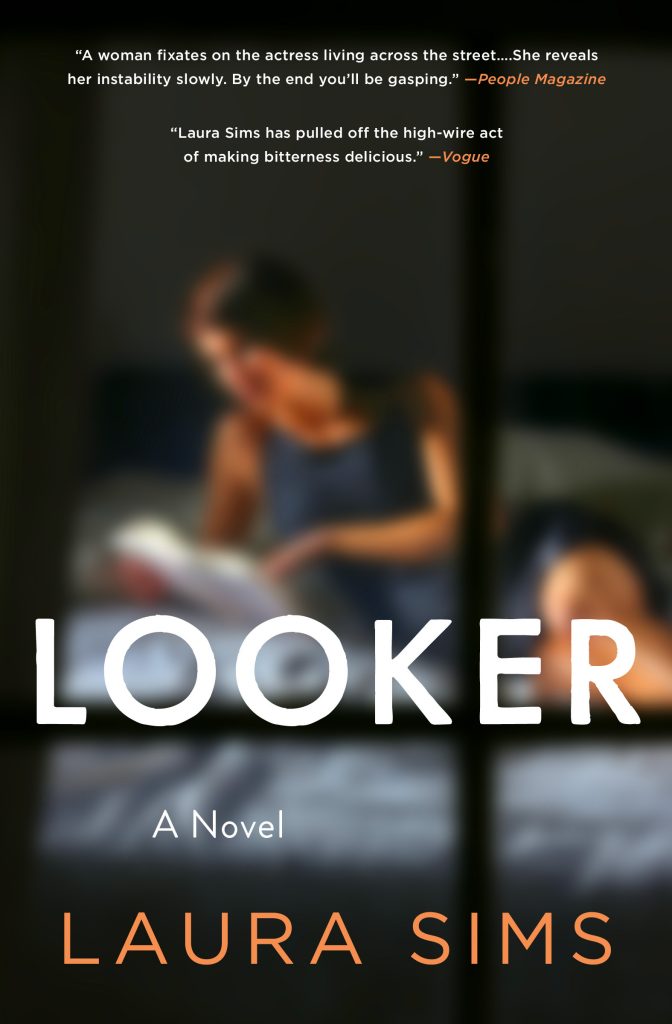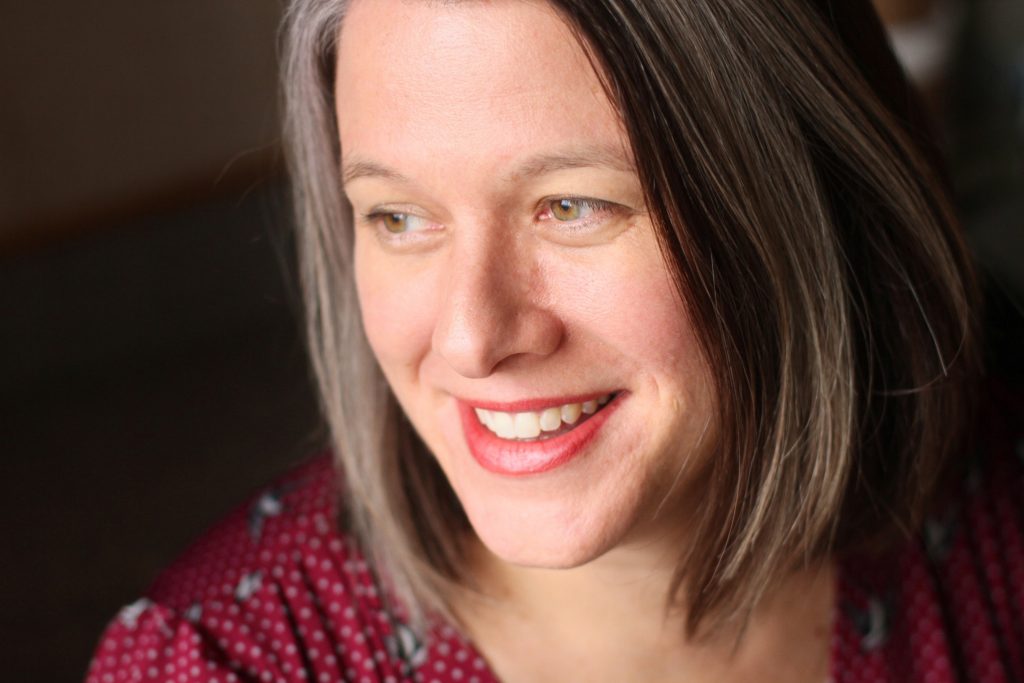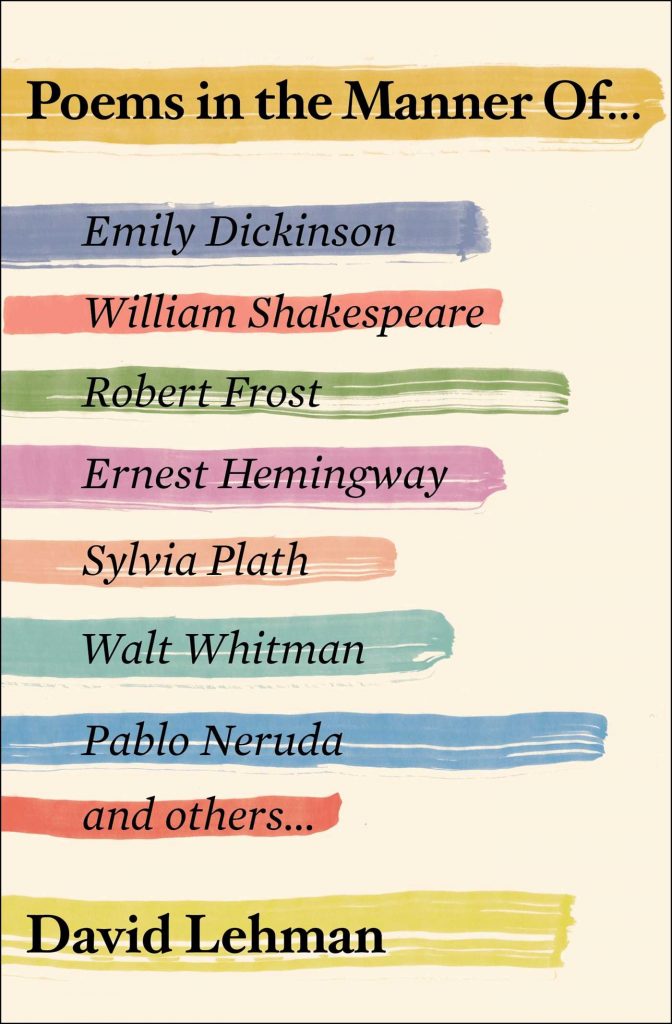
(Scribner, 2019)
INTERVIEW BY JO VARNISH
—
Laura Sims, author of the critically acclaimed Looker (Scribner, 2019) opens up about her debut novel, her process and her feelings on content warnings.
Jo Varnish: The paperback edition of your novel, Looker, comes out on October 1st. How would you describe the novel and its central themes?
Laura Sims: I’d describe it as a literary character study first and foremost, though it also has the fast pacing and dark storyline of a psychological thriller. It shouldn’t be confused with a typical thriller, though; it doesn’t make the expected genre moves—like plot twists and shocking revelations. The novel follows a woman whose life has recently imploded; in the wake of this, she becomes fixated on her neighbor, a famous actress who seems to have everything the narrator wants and believes she will never have: a stable, loving family, an exciting career, a beautiful home, status and wealth. In her obsession, the narrator acts out in increasingly unacceptable ways…and things go very badly.
Through the narrator’s situation, the book explores how toxic our culture of looking at others—whether in real life or on social media—can be. My narrator is particularly vulnerable and embittered by circumstance, but I think anyone can relate to comparing themselves to someone else and feeling decidedly “less than.” In my narrator’s case, some of this feeling can be attributed to how societal standards for women impact her life. She isn’t checking certain boxes women of her age and station are “supposed” to check, so this adds pressure and ultimately has disastrous results.
JV: There are some biographical similarities between you and your narrator. Like her, you used to live in Brooklyn, and also like her, you taught creative writing to adult students at a city school. How do you react to the inevitable questions of author-narrator merge?
LS: I just heard Phoebe Waller-Bridge address this question/issue in an interview. When asked how autobiographical “Fleabag” was, she said: “Women can make things up. It’s not all a diary.” That cracked me up—and also resonated with me. I think it’s true that women get questions about author-narrator or life-fiction merge far more often than men, as if it’s assumed that our imaginations are so limited, our lives so constricted, that we must rely on autobiography for our creative work. I definitely share some autobiographical facts (and a lipstick shade) with my narrator, and we all know that fiction writers do draw, to some extent, on their lives for their writing, but in the end: it doesn’t matter. The character and her story exist independently of the facts and circumstances of my life, and the work should be received, valued, and understood solely as a work of fiction.
JV: Where did you draw your inspiration for Looker’s story and characters?
LS: Living in Brooklyn was a huge inspiration for the novel, because of the way you live pressed up against people from all segments of the socioeconomic spectrum: middle-class families, homeless people, longtime working-class residents, and even celebrities. It was interesting to think of the different worlds we inhabited, all within a relatively small space, and what that kind of proximity might do to someone who perceives herself to be steps away, yet forever separated from a richer, better life. There was one particular day when I was walking home in the dead heat of August, lugging fifteen grocery bags from the store and girding myself to carry them up four flights, when a beautiful actress walked by. My immediate reaction was to envy her seemingly effortless elegance, and to wonder if she had ever carried grocery bags uphill in her life (probably not, I decided). That’s when another woman’s voice, bitter and raging at the world, popped into my head. She couldn’t stand seeing this entitled, richly dressed woman walk by so unencumbered, so carefree. She admired, despised, and envied her in equal measure. I went home, sat down, and started to write in that woman’s voice. The other characters around my narrator came pretty easily, as they were loosely inspired by ‘types’ in my Brooklyn neighborhood.

JV: Is the object of the narrator’s obsession a reflection on our fascination with celebrity insofar as she is a famous actress? Further, was your decision not to name the actress or the narrator a comment on our culture’s interest in surface at the cost of deeper identity?
LS: It can definitely be read as a reflection on our fascination with celebrity, though it wasn’t intentional. In our culture of constantly looking at celebrities, they seem an easy target for fixation, especially for someone who’s in a vulnerable state of mind. It’s potentially harmful to both parties—the looker and the looked at. It’s even dangerous—or unhealthy, at least, for people who aren’t particularly sensitive or damaged. To always be looking at others’ seemingly flawless lives can make our own lives feel thin and dreary by comparison—even if the seeming flawlessness is nothing but a show.
I didn’t intentionally leave my characters unnamed. It was something that happened naturally as I was writing the book, but looking back I see how their namelessness fits with Looker’s focus on how intertwined perception and identity can be. The actress is trapped by the narrator’s perception of her as “the actress”; she isn’t allowed to be more or less than that. And the narrator’s namelessness blots her out, just as she blots herself out, or perceives herself to be blotted out by society. But her namelessness is also useful because it erases the distance between reader and character and helps create the raw, even uncomfortable, intimacy that some readers have described.
JV: The narrator has a complicated relationship with her pet, Cat, who she refuses to return to her ex-husband. What do her changing feelings for Cat tell us about her mental state?
LS: As it shifts from one extreme to the other, her relationship with Cat reflects the moods and stages of her mental decline. She begins by seeing Cat as a nuisance, then shifts to loving her, adoring her, even, when she realizes Cat can be used to manipulate her ex-husband. When things deteriorate further in the narrator’s life, she becomes impatient, unkind. And then her final, most vicious act signals to us that she has finally crossed the line into what many would call madness.
JV: I was surprised to learn how strongly some readers have reacted to the narrator’s treatment of Cat. I know “content warnings” are increasingly used on Goodreads and elsewhere. How do you feel about such warnings?
LS: Yes, I was surprised, too. The moment in the book they’re responding to was the hardest scene for me to write, but it was also the most crucial; inevitable, I’d have to say. She had to do it. She had to show us just how far she’d come from her reasonably ordered, societally acceptable life: very far. I was happy to learn that people felt discomfort, anger, even outrage in response to that moment; it constitutes a powerful reaction to the book, and isn’t that what fiction and other art forms are for? To provoke, in the most general sense: to provoke thought and emotion. I find that ‘content warnings,’ in the sphere of literature, interfere with that crucial relationship between artwork and audience. They neutralize any potential threat to a reader’s state of mind, and in doing so they neutralize the work itself. Make it bland and safe for everyone, so that we may as well be watching a network sitcom (though they’ve come far in recent years) rather than reading a complex work of fiction.
JV: I find it impossible not to empathize with the narrator. Dealing with infertility and the breakdown of a marriage are understandably unsettling, and likely trigger her breakaway from reality. Was creating compassion for her intentional?
LS: I wouldn’t say it was intentional, but I did feel very deeply for her. I didn’t want her to be a two-dimensional villain. (I don’t think of her as a “villain” at all.) My hope is that readers will feel some measure of compassion and empathy for her—as you did—and will see in her some basic human desires: to love and be loved; to connect; to transcend the rigors, indignities, and monotony of everyday life. Maybe she heads down strange avenues in hopes of satisfying these desires, but the desires themselves are universal.
JV: Tell us about your process as a writer. What does a writing day typically look like for you? Over what time period did you write Looker?
LS: On my best, most productive days, I head to a co-working space in town right after the school bus leaves. I try to work for several hours in the morning there, when my focus is sharpest. Then I devote the rest of my day to family business, schoolwork (see below), exercise, errands, etc. But I find it really important to preserve and protect those morning hours when I can. It also depends on what stage I’m in of the writing process. Right now, I’m editing a finished draft, and while the morning hours are helpful, I end up working outside of those hours, too. I can’t stop working. But when I’m struggling my way through a first draft I need more structure to stay engaged. I find drafting painful and editing intoxicating and FUN.
I wrote Looker over a period of about three years. At the time, I was working on other creative projects, too: a young adult novel that never saw the light of day and a poetry book. I was also teaching part-time and getting my Master’s degree in Library & Info Science. (Still getting that degree, by the way. Almost done!) But Looker was my side project, my passion project—I couldn’t stop returning to it, and worked on it whenever I could. One of the things that’s been hardest about moving forward after Looker is trying to recapture that feeling of working on something that no one knows or cares about, in a kind of protective secrecy. It’s something new authors don’t talk about enough: how hard it is, after being seen, to go back and work on something in the same cloistered way you did before you’d published your book. I realize it’s a good problem to have, but it’s been a challenge nonetheless.
JV: For readers who loved Looker, what would you recommend they read next?
LS: There are several books that inspired me (in some way) in the writing of this novel, and I’d highly recommend them because they’re also some of my favorite contemporary novels: The Days of Abandonment, by Elena Ferrante, Dept of Speculation, by Jenny Offill, and Notes on a Scandal, by Zoe Heller. I wasn’t consciously drawing on these books when I was writing Looker, but thinking back, I know they were influential. Also The Yellow Wallpaper, by Charlotte Perkins Gilman. Reading that in college had a profound impact on me; it’s the ultimate tale of a woman’s downward spiral and the societal forces that hastened it. I’d also highly recommend Helen Phillips’ new book, The Need—it’s very different from Looker, but plays with genre, too, in that it’s a literary novel with a science fiction storyline and thriller pacing. It’s compulsively readable, beautifully written, and terrifying. Three of my favorite things.
JV: What are you working on at the moment?
LS: I’m working on a novel—well, to be honest, two novels. I’ve got complete drafts of both of them and am working to make them readable before passing them to my agent, who will help me whip them into shape.
JV: Lastly, Looker has a cinematic feel on reading. Are there any plans to bring your story to the big screen?
LS: Not to the big screen, but to the small screen! Emily Mortimer and Alessandro Nivola’s King Bee production company, along with eOne, have bought the rights to Looker. Emily will star as the narrator and produce. The screenwriters are working on the screenplay now; I can’t wait to see how they adapt it.
—
Laura Sims’s debut novel, Looker (Scribner), was published to critical acclaim in early 2019; The Wall Street Journal called it “a sugarcoated poison pill of psychological terror” and Publishers Weekly called it a “chilling and riveting debut.” Sims has also published four books of poetry, including, most recently, Staying Alive; her first poetry collection, Practice, Restraint, was the winner of the 2005 Fence Books Ottoline Prize. In 2014, she edited Fare Forward: Letters from David Markson. Sims has been the recipient of a US-Japan Creative Arts Fellowship, and her poetry and prose have appeared in The New Republic, Boston Review, Conjunctions, Denver Quarterly, Fence, Gulf Coast, and other journals. She lives in New Jersey with her family.
Originally from England, Jo Varnish now lives outside New York City. She is assistant editor at X-R-A-Y Literary Magazine, and her short stories and creative nonfiction have recently appeared, or are forthcoming, in Okay Donkey, Ellipsis Zine, Brevity Blog and others. Jo has been a writer in residence at L’Atelier Writers for two years, and is currently studying for her MFA. She can be found on twitter @jovarnish1.
![[PANK]](http://pankmagazine.com/wp-content/themes/pank/assets/images/pank-logo-large.png)

